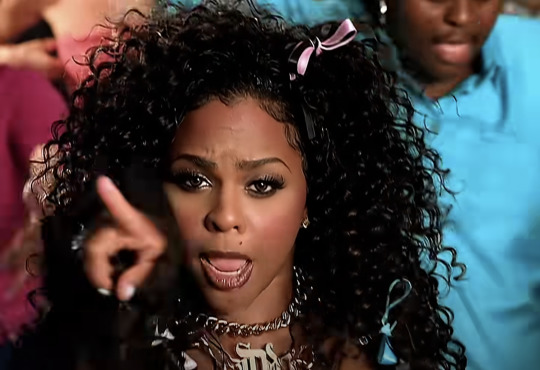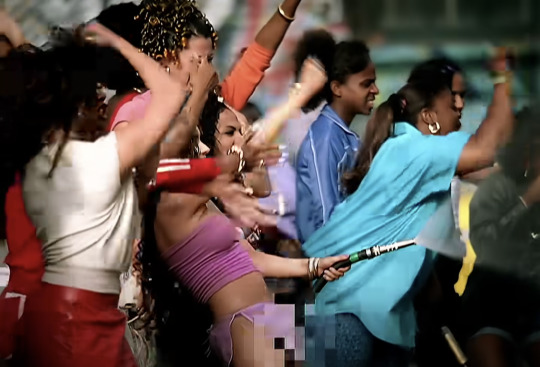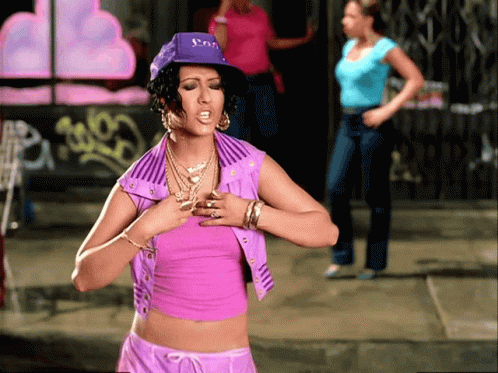Text
Discussion Presentation: Race and Representation
"Can't Hold Us Down"
"Can't Hold Us Down" by Christina Aguilera featuring Lil' Kim is a significant track from Aguilera's 2002 album "Stripped." Released in 2003 by RCA Records, this R&B and hip-hop song, marked by a dancehall outro, delves into themes of gender double standards and feminism. The track was written and produced by Scott Storch, with Aguilera and Matt Morris contributing to the songwriting. The song was distributed as a CD single across various countries and also received a 12-inch edition release in the United States. Lyrically, "Can't Hold Us Down" is a forthright critique of societal double standards, where men are often celebrated for behaviors that lead to women being negatively judged. This feminist anthem encourages women to be assertive and challenges the notion that women should be passive. Notably, the lyrics suggest a rebuke directed at rapper Eminem, who had previously referenced Aguilera in his songs. The song's reception was mixed. While some critics found the lyrics confrontational and empowering, others critiqued it as lackluster or a waste of talent. It garnered a nomination for Best Pop Collaboration with Vocals at the 2004 Grammy Awards but did not win. Despite these mixed reviews, "Can't Hold Us Down" has been recognized as a feminist anthem and a significant piece in Aguilera's discography, marking an important moment in feminist pop music. Commercially, the single achieved notable success. It reached number 12 on the U.S. Billboard Hot 100 and charted within the top ten in many countries worldwide. The music video for "Can't Hold Us Down," directed by David LaChapelle, was inspired by New York City's Lower East Side of the 1980s. Set on a Los Angeles soundstage, the video features a confrontation between Aguilera and a man, culminating in a symbolic act of defiance. The video, however, garnered some criticism for potentially conflicting with the song's feminist message due to its provocative nature.
youtube
"The Blackness of Blackness: A Critique on the Sign and the Signifying Monkey"
Tales of the Signifying Monkey, a symbol deeply entrenched in African American folklore. In the Blackness of Blackness essay, Henry Louis Gates' central thesis revolves around "signifying", which he argues, transcends mere linguistic meaning and embodies a form of cultural and political resistance, a way for African American writers to navigate and challenge the complexities of their social and historical contexts. Just as African American literary tradition has used signifying to assert identity and resist marginalization, contemporary artists like Christina Aguilera use music to voice similar struggles against societal constraints and injustices. In "Can't Hold Us Down", her direct confrontation of gender stereotypes and double standards mirrors the subversive nature of signifying in African American literature. She asserted:
"If a guy have three girls then he's the man,
He can even give her some head and sex her raw,
If a girl do the same then she's a whore."

The first line, "If a guy have three girls then he's the man," points to the common societal trope where men are often praised or admired for having multiple sexual partners. This is a reflection of a deeply ingrained mindset that equates masculinity with sexual conquest. The male is depicted as a figure of admiration for his ability to attract and engage with multiple partners, reinforcing traditional notions of male dominance and virility.
The second line, "He can even give her some head and sex her raw," delves into more explicit sexual territory, highlighting the freedom and lack of judgment men often experience in their sexual exploits. This line underscores the perceived entitlement of men to engage in sexual acts without fear of societal retribution or moral judgment.
And lastly, "If a girl do the same then she's a whore" sharply contrasts the previous malely behaviors, exposing the starkly different societal attitudes towards women who exhibit similar sexual behaviors. When a woman engages in the same level of sexual activity as her male counterparts, she is often subject to harsh judgment and derogatory labeling.
Overall, these lines criticize a pervasive societal hypocrisy where men and women are judged and valued differently for the same actions. In Gates' framework, the these lyrics can be seen as an act of 'signifying' against patriarchal structures. They reveal and critique the hypocrisy in societal attitudes toward sexuality, paralleling how African American writers use signifying to address and resist racial stereotypes and injustices.

“STEREOTYPE, REALISM AND THE STRUGGLE OVER REPRESENTATION”
In "Stereotype, Realism", Ella Shohat and Robert Stam delve into the field of media representation, particularly in cinema, focusing on the portrayal of ethnic, racial, and colonial subjects. They critique the narrow focus on verisimilitude in media representations, which often perpetuates stereotypes rather than challenging them. They argue that representations in media are a "delegation of voice", influencing public perception and understanding of various communities. Just as the authors critique the media's role in perpetuating stereotypes and reinforcing societal norms, Aguilera's song challenges the stereotypical representation of women as passive or submissive. She asserted 2 consecutive questions at the very beginning of the song:
So, what, am I not supposed to have an opinion?
Should I keep quiet just because I'm a woman?

Firstly, the rhetorical question "So what am I not supposed to have an opinion?" challenges the often unspoken rule that women should be passive or less vocal about their views, especially in domains traditionally dominated by men. This line questions the legitimacy of societal norms that dictate women's behavior, suggesting a rebellion against the idea that women's opinions are less valuable or should be suppressed.
The follow-up question, "Should I keep quiet just because I'm a woman?" further underscores the gender bias inherent in expectations around speech and expression. This line directly confronts the sexist notion that a woman's primary role is to be seen and not heard, a concept that has long been used to marginalize and silence women. By posing this question, Aguilera not only rejects this outdated stereotype but also empowers her listeners, particularly women, to question and resist these societal norms.
These lines, act as a form of counter-narrative, pushing against the dominant media, portraying the often marginalized or silenced women's voices. They also embodies the concept of "progressive realism" that Shohat and Stam discuss, where marginalized groups use media to combat dominant, stereotypical narratives. The song's assertive tone and its message of female empowerment and resistance against gender stereotypes exemplify an alternative narrative, one that challenges the traditional representations and pushes for a more nuanced, respectful portrayal of women.

Discussion Questions!
How do societal expectations regarding gender roles and sexuality manifest in today's dating culture, and what steps can individuals and communities take to address and change these double standards?
In what ways do current popular music and other forms of media challenge or reinforce stereotypes about gender and sexuality? Discuss with examples from recent years.
Reflect on the concept of "signifying" as a form of resistance. How do marginalized groups today use social media and other digital platforms to signify their identities and resist stereotypes?
Consider the role of media representation in shaping societal views. How can media producers, consumers, and critics work together to ensure more diverse and realistic portrayals of all genders and ethnicities?
3 notes
·
View notes
Text
Discussion Presentation: Race and Representation
"Can't Hold Us Down"
"Can't Hold Us Down" by Christina Aguilera featuring Lil' Kim is a significant track from Aguilera's 2002 album "Stripped." Released in 2003 by RCA Records, this R&B and hip-hop song, marked by a dancehall outro, delves into themes of gender double standards and feminism. The track was written and produced by Scott Storch, with Aguilera and Matt Morris contributing to the songwriting. The song was distributed as a CD single across various countries and also received a 12-inch edition release in the United States. Lyrically, "Can't Hold Us Down" is a forthright critique of societal double standards, where men are often celebrated for behaviors that lead to women being negatively judged. This feminist anthem encourages women to be assertive and challenges the notion that women should be passive. Notably, the lyrics suggest a rebuke directed at rapper Eminem, who had previously referenced Aguilera in his songs. The song's reception was mixed. While some critics found the lyrics confrontational and empowering, others critiqued it as lackluster or a waste of talent. It garnered a nomination for Best Pop Collaboration with Vocals at the 2004 Grammy Awards but did not win. Despite these mixed reviews, "Can't Hold Us Down" has been recognized as a feminist anthem and a significant piece in Aguilera's discography, marking an important moment in feminist pop music. Commercially, the single achieved notable success. It reached number 12 on the U.S. Billboard Hot 100 and charted within the top ten in many countries worldwide. The music video for "Can't Hold Us Down," directed by David LaChapelle, was inspired by New York City's Lower East Side of the 1980s. Set on a Los Angeles soundstage, the video features a confrontation between Aguilera and a man, culminating in a symbolic act of defiance. The video, however, garnered some criticism for potentially conflicting with the song's feminist message due to its provocative nature.
youtube
"The Blackness of Blackness: A Critique on the Sign and the Signifying Monkey"
Tales of the Signifying Monkey, a symbol deeply entrenched in African American folklore. In the Blackness of Blackness essay, Henry Louis Gates' central thesis revolves around "signifying", which he argues, transcends mere linguistic meaning and embodies a form of cultural and political resistance, a way for African American writers to navigate and challenge the complexities of their social and historical contexts. Just as African American literary tradition has used signifying to assert identity and resist marginalization, contemporary artists like Christina Aguilera use music to voice similar struggles against societal constraints and injustices. In "Can't Hold Us Down", her direct confrontation of gender stereotypes and double standards mirrors the subversive nature of signifying in African American literature. She asserted:
"If a guy have three girls then he's the man,
He can even give her some head and sex her raw,
If a girl do the same then she's a whore."

The first line, "If a guy have three girls then he's the man," points to the common societal trope where men are often praised or admired for having multiple sexual partners. This is a reflection of a deeply ingrained mindset that equates masculinity with sexual conquest. The male is depicted as a figure of admiration for his ability to attract and engage with multiple partners, reinforcing traditional notions of male dominance and virility.
The second line, "He can even give her some head and sex her raw," delves into more explicit sexual territory, highlighting the freedom and lack of judgment men often experience in their sexual exploits. This line underscores the perceived entitlement of men to engage in sexual acts without fear of societal retribution or moral judgment.
And lastly, "If a girl do the same then she's a whore" sharply contrasts the previous malely behaviors, exposing the starkly different societal attitudes towards women who exhibit similar sexual behaviors. When a woman engages in the same level of sexual activity as her male counterparts, she is often subject to harsh judgment and derogatory labeling.
Overall, these lines criticize a pervasive societal hypocrisy where men and women are judged and valued differently for the same actions. In Gates' framework, the these lyrics can be seen as an act of 'signifying' against patriarchal structures. They reveal and critique the hypocrisy in societal attitudes toward sexuality, paralleling how African American writers use signifying to address and resist racial stereotypes and injustices.

“STEREOTYPE, REALISM AND THE STRUGGLE OVER REPRESENTATION”
In "Stereotype, Realism", Ella Shohat and Robert Stam delve into the field of media representation, particularly in cinema, focusing on the portrayal of ethnic, racial, and colonial subjects. They critique the narrow focus on verisimilitude in media representations, which often perpetuates stereotypes rather than challenging them. They argue that representations in media are a "delegation of voice", influencing public perception and understanding of various communities. Just as the authors critique the media's role in perpetuating stereotypes and reinforcing societal norms, Aguilera's song challenges the stereotypical representation of women as passive or submissive. She asserted 2 consecutive questions at the very beginning of the song:
So, what, am I not supposed to have an opinion?
Should I keep quiet just because I'm a woman?

Firstly, the rhetorical question "So what am I not supposed to have an opinion?" challenges the often unspoken rule that women should be passive or less vocal about their views, especially in domains traditionally dominated by men. This line questions the legitimacy of societal norms that dictate women's behavior, suggesting a rebellion against the idea that women's opinions are less valuable or should be suppressed.
The follow-up question, "Should I keep quiet just because I'm a woman?" further underscores the gender bias inherent in expectations around speech and expression. This line directly confronts the sexist notion that a woman's primary role is to be seen and not heard, a concept that has long been used to marginalize and silence women. By posing this question, Aguilera not only rejects this outdated stereotype but also empowers her listeners, particularly women, to question and resist these societal norms.
These lines, act as a form of counter-narrative, pushing against the dominant media, portraying the often marginalized or silenced women's voices. They also embodies the concept of "progressive realism" that Shohat and Stam discuss, where marginalized groups use media to combat dominant, stereotypical narratives. The song's assertive tone and its message of female empowerment and resistance against gender stereotypes exemplify an alternative narrative, one that challenges the traditional representations and pushes for a more nuanced, respectful portrayal of women.

Discussion Questions!
How do societal expectations regarding gender roles and sexuality manifest in today's dating culture, and what steps can individuals and communities take to address and change these double standards?
In what ways do current popular music and other forms of media challenge or reinforce stereotypes about gender and sexuality? Discuss with examples from recent years.
Reflect on the concept of "signifying" as a form of resistance. How do marginalized groups today use social media and other digital platforms to signify their identities and resist stereotypes?
Consider the role of media representation in shaping societal views. How can media producers, consumers, and critics work together to ensure more diverse and realistic portrayals of all genders and ethnicities?
3 notes
·
View notes
Text
Ren Question
Both readings touched on cultural politics and crisis. In "Culture and Anarchy", Arnold emphasizes that culture improves society by providing intellectual development and social improvement, and views it as an inward pursuit of perfection. On the other hand, Leavis contends in "Mass Civilization" that mass civilization has led to a decline in culture. It highlights the challenges of distinguishing genuine culture from cheap emotional appeals in a society inundated with various inputs. Leavis sees a crisis in culture due to the divorce of power and authority from it.
What really raised my interest was the part about religion in "Culture and Anarchy", that is, do people have the right to explain the religious text themselves, but not by more knowledgeable religious personnel such as a priest after we know that provincialism arises easily in nonconformist or self-made religious groups?
0 notes
Text
A video clip I made about Daito combating mega Godzilla in ready player one
2 notes
·
View notes